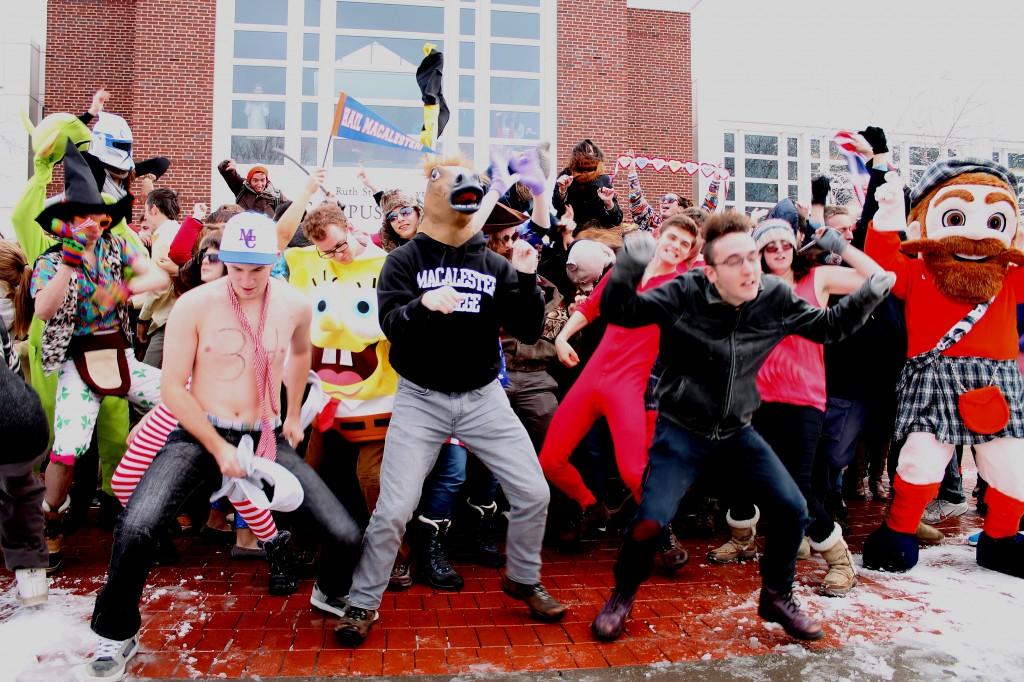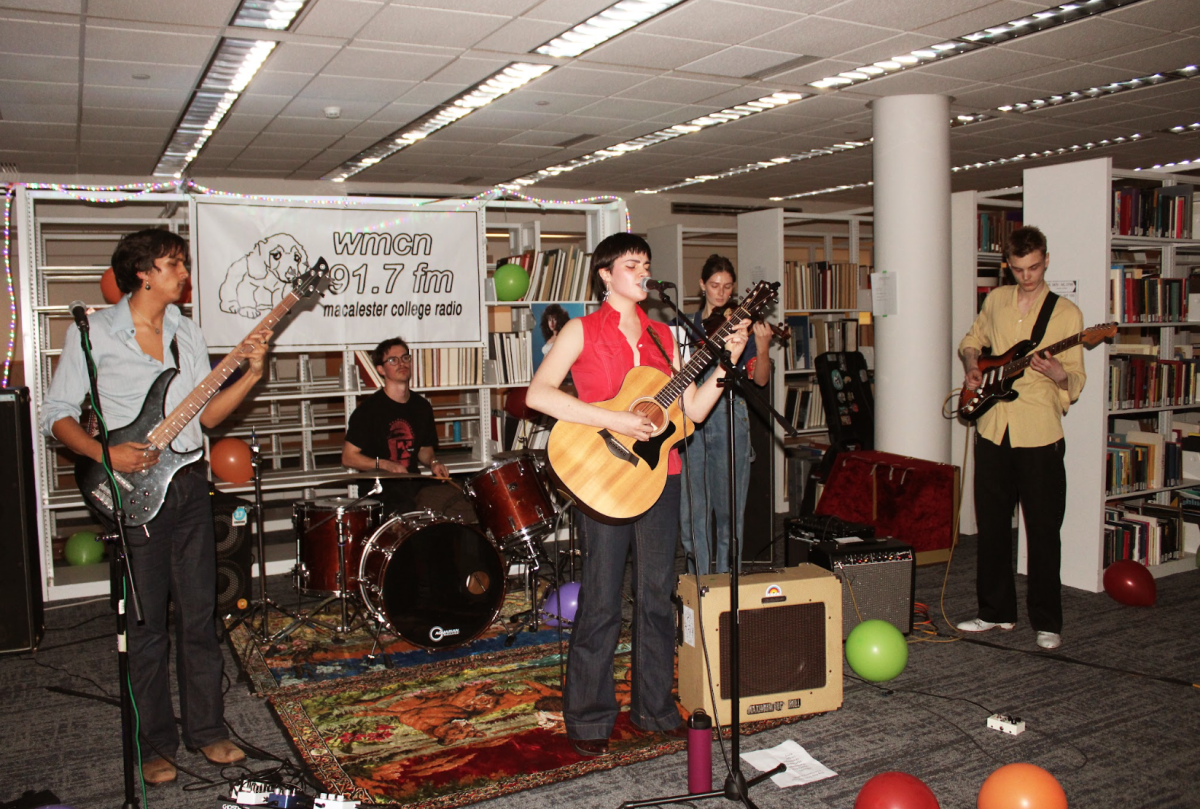
In case you lack an Internet connection and somehow haven’t heard, the Harlem Shake is kind of a big deal. The song that inspired the craze, by Mad Decent trap artist Baauer, is topping the charts. Baauer played at the Loft in Minneapolis with veteran producer and DJ Just Blaze, at the peak of the song’s hype (or the beginning of its decline, depending on who you ask). The show sold out the Loft at Barfly (not to be confused with the Loft Literary Center, another great venue with a very different mission) and Baauer seemed to be enjoying his new found popularity; dancing the entire time as he dropped old school T.I alongside new trap/EDM hits like Bird Machine and Higher Ground, even adding a Red Hot Chili Peppers song to the mix.
Baauer remains light-hearted when discussing his breakout hit, recently tweeting of the song, “should have named it bleep bleep tiger sound.” Despite the ubiquity of Harlem Shake, Rodrigues doesn’t seem to resent it or the type of attention it has brought him, as those who quickly rise to viral fame often do. When asked about his song and the rising popularity of trap music on a recent Reddit AMA, he responded:
“It’s exciting to see all of these hip hop elements in dance music, and vice versa. i think with the freedom that we have as producers, with literally every sound at our fingertips, we will continue to build and mix different sounds. music is moving incredibly fast which means there’s always something fresh out there, something inspiring.”
It’s refreshing to watch an up and coming artist remain good-natured and levelheaded about his newfound success. In interviews, Baauer exudes nothing but positivity and seems authentically happy that people are enjoying his music—he has yet to slip up and engage in arguments with detractors or snub new fans (take notes, Azealia Banks). He also appears humble, careful not to overstate his own influence. It seems that his far-reaching viral success came as a genuine surprise.
It seems harmless, right? An unpretentious and fairly talented producer rises to fame because of a viral video craze involving his song. He maintains a sense of humor about the situation and is genuinely excited that people enjoy his music. The song Harlem Shake is not musically revolutionary. “I just had the idea of taking a Dutch house squeaky-high synth and putting it over a hip-hop track,” Baauer explains. The vocal sample used (“And do the Harlem Shake”) comes from a song called Miller Time by Philadeliphia based rap group Plastic Little, whose vocalist Jayson Musson explained that the lyric was about a fight in which a rival street artist hit him in the face with a bottle. Musson successfully defended himself but wasn’t sure what to do to end the fight, so he did the Harlem Shake. Here, Musson refers to the 1980’s dance that originated in Harlem, New York.
During his AMA, Reddit user Nastarr asked Baauer, “What do you think of people not actually doing the Harlem Shake in any of the Harlem Shake videos?” to which Baauer responded “Honestly, I’m just happy to see people go crazy to my stuff.” But not everyone sees eye to eye with Baauer about this. And for a while, this dissatisfaction went unarticulated within the media coverage the song received. The opposition to the Harlem Shake meme was overshadowed by the videos’ popularity. Then filmmaker Chris McGuire made a video and this too, went viral (to a much lesser degree, admittedly, but 7 million views is a start). McGuire’s video operates on a simple premise: ask people who actually live in Harlem what they think about the viral video craze. Some responses included: “It’s actually an art form—a dance art form. It doesn’t have the respect that it should deserve,” “People on West 4th Street would do that, nobody in Harlem would do that” and most concisely, “they’re basically taking our dances and making a joke of it.” When questioned about the video by the Huffington Post, McGuire talked about his participation in a Baauer Harlem Shake video, and subsequent realization of its damaging potential:
“I felt like someone who had sinned, and saw the error of his ways. As such, I decided to let the people of Harlem tell the world what they thought…they thought it was crap and had nothing to do with the dance or culture that they so proudly identified with.”
The video is not flawless—it leans heavily on Harlem stereotypes and presents a one sided view. It wouldn’t be impossible to go into Harlem and find just as many people who enjoyed the videos. But it brings up an important point: the Harlem Shake isn’t all fun and games.
The explosion of the meme has far reaching cultural implications. It seems as if the original dance no longer owns its name. A google search of “Harlem Shake” returns mostly results about the meme. When a website, definition, or concept is “google bombed” out of the top results by a more popular (but often less informative) result, its importance can become tremendously underestimated. Thus, the original Harlem Shake is at risk of losing its place in cultural memory. Although this may not be an intentional attack, the damage may be permanent.
A Mashable user called the meme “stealing a Harlem gem and re-packaging it as white genius.” As a SPIN commenter pointed out, “The dance was our thing. Something our kids and neighbor’s kids did at the park, the ballgame or the block party. So if you understand the notion of something that is particular to a neighborhood (that is steadily having “its thing” taken away from it by outsiders) then you get the point.” Harlem has every right to be upset, and the history of mainstream appropriation of black culture without acknowledgement makes the trend even more alarming.
The debate stirred by McGuire’s video has become contentious. A war has broken out in Comments sections across the Internet, with one side shouting in all caps “APPROPRIATION!” while the videos’ defenders fire back “BUZZKILL!” But let’s not abandon ship just yet. Are the Harlem Shake videos of 2013 intentional mockery of an art form, or just a bunch of kids doing a really poor interpretation of a style of dance to a catchy song? It is difficult to locate where appreciation ends and appropriation begins. Maybe Baauer set out to take something from Harlem. But it seems far more likely that he was going through some music, found a vocal clip in which the singer urged the audience to do something that familiarly registered as a dance (not thinking about this dance and its cultural associations was careless at best), and said “This’ll do.” And Rodrigues didn’t have a part in determining the video’s formula—surprisingly, Mad Decent label head and marketing genius Diplo (who has come under fire for cultural appropriation more than once) didn’t come up with this one; it was entirely developed by youtube users.
The viral videos are short and easy to watch en masse. They’re catchy and provide a simple formula with room for improvisation. It’s something that is both massively popular and participatory—anyone can be a part of it, which accounts for a large part of its appeal. Convincing arguments have been made that the “Harlem Shake” lyric is irrelevant to the trend, and it wouldn’t be any less popular by any other name. In this view, it ceases to be an assault on Harlem—the beat would still be catchy, the videos would still be easy, the hit would still go viral. But the song does say “Harlem Shake,” and the Harlem Shake is a dance that already existed, so we must interpret it through this lens.
It is difficult to locate the intentions of the video makers: is it a malicious mockery of the Harlem Shake, or just a lack of understanding of the dance and its surrounding culture? The trend is undoubtedly detrimental and problematic, regardless of the intentions of creators and participants. But it contains more than just vitriol and harm. The videos also contain a self-aware reference to the craze that follows EDM culture—the idea of the “bass face” and the hedonism of raves. And as Vice writer Drew Millard aptly stated, “uploading a video of you and your friends wiggling around to the same song as other groups of friends makes everybody feel a little less alone in this desolate, unloving universe.”
The meme is essentially dead—your parents and even that crazy uncle who sends on chain emails have most likely heard of it by now and possibly even sent you a video (ugh). It is joining with other memes in a way that’s indescribably irritating (Grumpy Cat Harlem Shake? I’ll pass). Is it really the worst thing we have on our plates right now? Probably not. I do not want to argue that we should stop looking at it critically because there are more problematic fish in the sea, but that we should put it into perspective. There is still potential for good beyond the troubling consequences that may occur. Thanks to the volume of online debate, people are learning about the actual Harlem shake and why the meme may be problematic (take a look at the comments section of any article about the Harlem Shake – it is sometimes discouraging, but critical discussion it happening out there!) Similarities between the original Harlem shake and an Ethiopian dance called Eskita have been pointed out, prompting Ethiopian youtube users to upload videos of their dance to Baauer’s tune. The general public’s knowledge of dance histories (and cultural histories that go along with them) may be on the rise. And once the dangers of the song’s careless-at-best reference to an important cultural phenomenon are recognized, hopefully the mistake will be less likely to be repeated.


















Tracey Fisher • Sep 12, 2019 at 12:13 am
You, my pal, ROCK! I found exactly the info I already searched all over the place and simply could not find it. What a perfect site.
Kevin Wilkins • Sep 10, 2019 at 5:43 pm
You made some first rate points there. I looked on the web for the difficulty and found most people will go together with with your website.
Adrian Black • Sep 5, 2019 at 1:22 pm
its good as your other articles : D, thankyou for putting up.